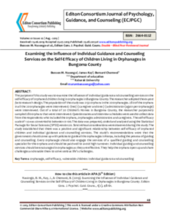ABSTRACT: The purpose of this study was to examine the influence of individual guidance and counselling services on the self-efficacy of orphaned children living in orphanages in Bungoma County. The researcher adopted the ex-post facto research design. The population of the study was 2132 orphans in the 20 orphanages. 280 of the orphans in all the 20 orphanages were interviewed. One (1) caregiver and one (1) administrator (again per orphanage) were interviewed. Out of a total of 20 Children’s Homes in Bungoma County, the researcher purposively sampled 280 orphans that were interviewed. Questionnaires and interview schedules were used to collect data from the respondents who included the orphans, orphanages administrators and caregivers. The self-efficacy scale of 1-4 was converted to between 0-100. The data was prepared, coded and analyzed using the Statistical Package for Social Sciences (SPSS) version 20. Strict ethical considerations wereobserved during the study. The study established that there was a positive and significant relationship between self-efficacy of orphaned children and individual guidance and counselling services. The study’s recommendations were that the government should come up with policies to guide all the orphanages in Kenya, including the process of guiding and counselling. Every orphanage should also engage the services of a qualified guiding and counselling specialist for the orphans and should be paid well to avoid high turnover. Individual guiding and counselling services should be encouraged in orphanages as they are effective. They help the orphans open up and share challenges and enable them to solve serious life’s challenges.

